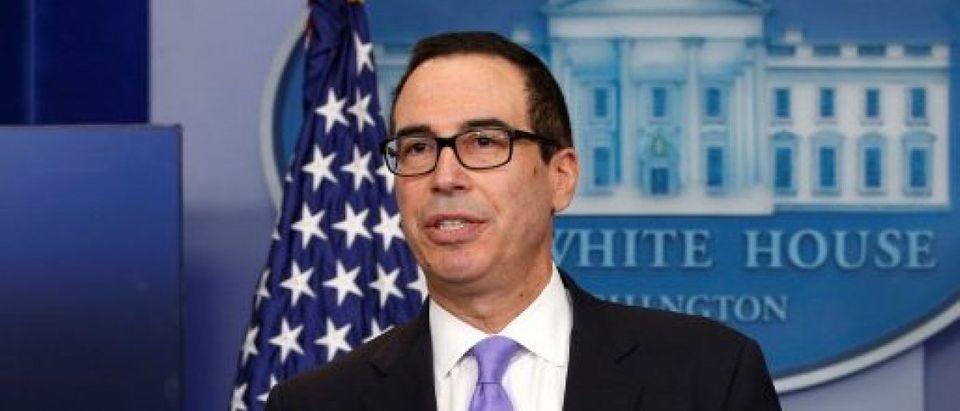President Donald Trump could very well use the debt ceiling as leverage against Congressional Democrats trying to upend his primary legislative agendas: Obamacare repeal, tax and regulatory reform, infrastructure spending and border control.
The debt ceiling will be reinstated at the total outstanding value of U.S. debt Thursday, a figure roughly estimated at around $20 trillion.
Secretary of the Treasury Steve Mnuchin has called on Congress to raise the U.S. debt limit “at its first opportunity.” Mnuchin warned Congress in a letter dated Mar. 7, 2016, that the Treasury would stop issuing some state and local securities once the debt ceiling takes effect Thursday.
The secretary promised that, starting Thursday, the Treasury would enact “extraordinary measures” to ensure the U.S. does not default on its debt. “As I said in my confirmation hearing, honoring the full faith and credit of our outstanding debt is a critical commitment. I encourage Congress to raise the debt limit at the first opportunity so that we can proceed with our joint priorities,” Mnuchin wrote.
Any serious negotiations or decisions regarding the debt ceiling are likely months away. The Congressional Budget Office (CBO) predicts that the Treasury will run out of funds “sometime in the fall of 2017.”
If investors or markets get nervous, especially if the negotiation process takes time or it looks like the U.S. will default on its debt, there could be some residual market corrections and downgrading of U.S. debt ratings.
Congress brought the federal government to a near-halt when it failed to make a timely decision regarding the debt ceiling in 2011, causing the S&P to downgrade U.S. debt for the first time in its history. The legislative body decided to raise the debt ceiling that year, but the discussion was only pushed back till 2015.
Facing another complete government shutdown, Congress was once again unable to reach a decision regarding a dollar amount cap on borrowing. Instead, Congress figured it would suspend the debt ceiling all together until Mar. 16, 2017.
Senate Majority Leader Mitch McConnell promises that the government is not going to default. It remains somewhat unclear how the Trump administration is going to play the debt ceiling politically. The decision could ultimately hinge on the whether the president himself is the one with his finger on the proverbial trigger, or if it is a policy advisor and cabinet member, like Mnuchin or Director of the Office of Management and Budget Mick Mulvaney, who makes the decision.
Trump himself was highly critical of the Congressional Republicans moving to raise the debt ceiling in the past, calling them, “pathetic,” and “the worst negotiators in history.” Mulvaney had a history while serving in Congress of using budget negotiations to achieve his preferred policy agendas. The director used the debt ceiling as political leverage against former President Barack Obama in order to push spending cuts.
White House Press Secretary Sean Spicer hasn’t necessarily made the administration’s stance any clearer. Speaking at the White House press briefing Thursday about Mnuchin’s letter, Spicer merely acknowledged the secretary’s warning and promised that it was on the mind of the president.
“I think we’ve got a few months to do that. I think the Secretary was making Congress very much aware. We’ve now been in the White House six weeks; we’re approaching the fiftieth day here of this administration,” Spicer said.
“Obviously, there are certain things that are a little beyond our control when we walk into this building, and we’re going to work with Secretary Mnuchin and Director Mulvaney to address this issue, and obviously with Congress,” Spicer continued.
If the president’s comments in 2013 are illustrative of what his stance might be in the coming months, Trump may advise Republicans in Congress to use the debt ceiling negotiation process to get Democrats to make some concessions.
Send tips to robert@dailycallernewsfoundation.org
All content created by the Daily Caller News Foundation, an independent and nonpartisan newswire service, is available without charge to any legitimate news publisher that can provide a large audience. All republished articles must include our logo, our reporter’s byline and their DCNF affiliation. For any questions about our guidelines or partnering with us, please contact licensing@dailycallernewsfoundation.org.


